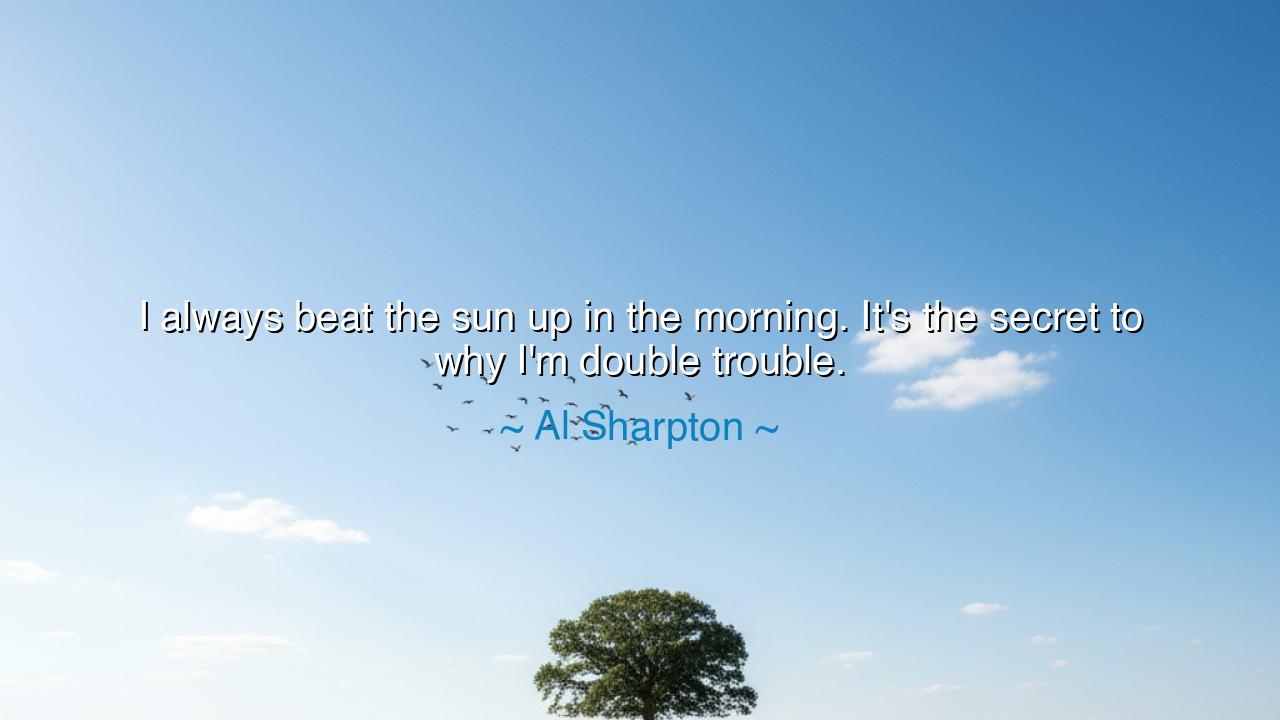
I always beat the sun up in the morning. It's the secret to why






"I always beat the sun up in the morning. It’s the secret to why I’m double trouble." Thus declared Al Sharpton, a man whose life has been lived on the battleground of words and justice. His voice, sharpened by struggle, reveals here a truth older than the empires of men: that victory belongs to those who rise before the dawn, who prepare themselves while the world still slumbers. To beat the sun up is not merely to awaken early—it is to declare mastery over time, to harness the silent hours before the day begins, and to step into the world already armed with energy and resolve.
The morning before the sun is a realm of power, a sacred space that belongs to the disciplined. In those quiet hours, when others dream, the one who rises sets his mind, strengthens his body, and sharpens his purpose. By the time the sun appears, he is already in motion, already ahead, already victorious. Sharpton calls this his secret, the reason he is “double trouble.” For to rise before light is to fight with two weapons: the strength of preparation and the advantage of swiftness. The world cannot catch him, for he has already run a mile before it stirs.
History, too, sings this truth. Alexander the Great was known to rise before dawn, reviewing his troops and walking among them, showing that a leader must be vigilant when others rest. Benjamin Franklin, in another age, wrote that he who rises early reaps wisdom, wealth, and health. And the desert fathers, hermits who sought holiness, rose in the blackness of night to pray before the sun, believing that the first hours belonged to God alone. In each story, we see the same lesson: those who rise before the world owns the day often master both themselves and their destiny.
Sharpton’s words are also laced with defiance. To be “double trouble” is not merely to be effective; it is to be formidable, to be a force that unsettles the comfortable and awakens the complacent. He suggests that his energy, his persistence, his unwillingness to yield, are rooted in his habit of rising early. While others are still stretching and stumbling into daylight, he has already set the tone, already prepared his voice, already taken the fight into his hands. The dawn becomes not a beginning, but a continuation of the work he has already begun.
There is also a spiritual undercurrent here. To rise before the sun is to align oneself with creation itself. The stars still shine, the air is pure, and silence reigns. It is a time when the mind is clearest, when distractions have not yet broken the day, when the soul can hear its own voice most sharply. To live in this rhythm is to walk as the ancients did, who saw dawn not merely as light, but as a rebirth. Each morning becomes a victory over sloth, over doubt, over inertia.
The lesson is plain: rise before the world, and you will master it. Do not wait for the sun to summon you from sleep—summon yourself. Claim the still hours for preparation, for thought, for discipline. Whether you pray, write, train, or plan, let the dawn find you already moving. For the man who beats the sun does not merely begin the day; he conquers it before it begins.
Practical action follows: set your waking hour earlier than the light. Begin with small steps—an hour, then two, until you claim the silence as your ally. Use that time not in waste, but in purpose. Strengthen your body, sharpen your mind, or set your course for the day. And when others rise with the sun, you will already have become, as Sharpton says, “double trouble”—one step ahead, untouchable in spirit, and impossible to ignore.
Thus let his words echo as both challenge and charge: do not wait for life to waken you. Beat the sun. Own the morning. And by doing so, you will hold in your hand not just the day, but your destiny.






AAdministratorAdministrator
Welcome, honored guests. Please leave a comment, we will respond soon